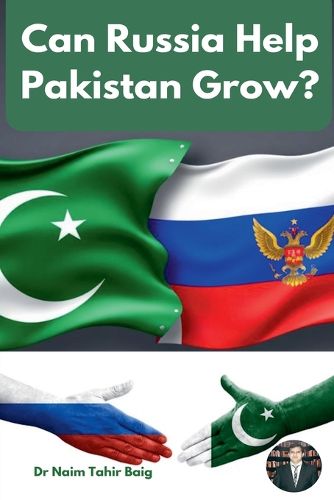Readings Newsletter
Become a Readings Member to make your shopping experience even easier.
Sign in or sign up for free!
You’re not far away from qualifying for FREE standard shipping within Australia
You’ve qualified for FREE standard shipping within Australia
The cart is loading…






This title is printed to order. This book may have been self-published. If so, we cannot guarantee the quality of the content. In the main most books will have gone through the editing process however some may not. We therefore suggest that you be aware of this before ordering this book. If in doubt check either the author or publisher’s details as we are unable to accept any returns unless they are faulty. Please contact us if you have any questions.
Book Description
Can Russia Help Pakistan Grow? is a groundbreaking analysis of the potential for enhanced cooperation between the Russian Federation and Pakistan. Dr. Naim Tahir Baig examines this evolving bilateral relationship through the lens of Pakistan's critical development needs and Russia's capabilities as a major world power with significant expertise in energy, defense, agriculture, and technology.
This comprehensive study explores the historical context of Russia-Pakistan relations, from Cold War estrangement to recent diplomatic warming, and analyzes specific sectors where Russian expertise could contribute to Pakistan's development objectives. The book provides a balanced assessment of both opportunities and challenges, including the geopolitical complexities involving India, China, and Western powers that inevitably shape bilateral engagement.
Drawing on extensive research and authentic data, Dr. Baig offers concrete recommendations for policymakers, businesses, and civil society to foster sustainable cooperation that serves both countries' interests. Neither overly optimistic nor unnecessarily pessimistic, this work provides a pragmatic roadmap for relationship development that acknowledges real-world constraints while identifying genuine opportunities for mutually beneficial partnership.
Essential reading for diplomats, business leaders, academics, and anyone interested in South Asian geopolitics and development, this book fills a significant gap in the literature on Pakistan's international relations and provides valuable insights into Russia's evolving role in South Asia.
$9.00 standard shipping within Australia
FREE standard shipping within Australia for orders over $100.00
Express & International shipping calculated at checkout
This title is printed to order. This book may have been self-published. If so, we cannot guarantee the quality of the content. In the main most books will have gone through the editing process however some may not. We therefore suggest that you be aware of this before ordering this book. If in doubt check either the author or publisher’s details as we are unable to accept any returns unless they are faulty. Please contact us if you have any questions.
Book Description
Can Russia Help Pakistan Grow? is a groundbreaking analysis of the potential for enhanced cooperation between the Russian Federation and Pakistan. Dr. Naim Tahir Baig examines this evolving bilateral relationship through the lens of Pakistan's critical development needs and Russia's capabilities as a major world power with significant expertise in energy, defense, agriculture, and technology.
This comprehensive study explores the historical context of Russia-Pakistan relations, from Cold War estrangement to recent diplomatic warming, and analyzes specific sectors where Russian expertise could contribute to Pakistan's development objectives. The book provides a balanced assessment of both opportunities and challenges, including the geopolitical complexities involving India, China, and Western powers that inevitably shape bilateral engagement.
Drawing on extensive research and authentic data, Dr. Baig offers concrete recommendations for policymakers, businesses, and civil society to foster sustainable cooperation that serves both countries' interests. Neither overly optimistic nor unnecessarily pessimistic, this work provides a pragmatic roadmap for relationship development that acknowledges real-world constraints while identifying genuine opportunities for mutually beneficial partnership.
Essential reading for diplomats, business leaders, academics, and anyone interested in South Asian geopolitics and development, this book fills a significant gap in the literature on Pakistan's international relations and provides valuable insights into Russia's evolving role in South Asia.